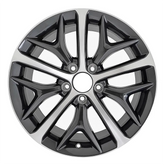Buying OEM Wheels: What to Know Before You Purchase

- 1. Why Choose OEM Wheels?
- 2. Understanding Wheel Sets: Full Set Benefits
- 3. How to Select OEM Wheels for Sale
- 4. Sourcing High-Quality OEM Wheels for Sale
- 5. Comparing OEM Wheels and Aftermarket Alternatives
- 6. Performance Considerations for Every Driver
- 7. Tips for First-Time OEM Wheel Buyers
- 8. Sustainability and Refurbished OEM Wheels
- 9. How Often Should You Replace OEM Wheels?
- 10. Frequently Asked Questions (FAQs)
- 11. Conclusion
Are you considering buying OEM wheels for sale? Deciding to buy OEM wheels for sale is a smart move if you value safety, durability, and peace of mind. With so many choices available today, understanding the essentials will help you make the right investment.
Why Choose OEM Wheels?
Original Equipment Manufacturer (OEM) wheels are the same wheels your vehicle brand installs at the factory. These aren’t replicas or generic alternatives—they are engineered specifically for your car model.
- Guaranteed Fit: Buying OEM wheels eliminate worries about mismatched sizing or compatibility issues. Exact specifications mean your wheels will fit seamlessly.
- Engineered for Performance: Automakers rigorously test OEM wheels for durability, load-bearing capacity, and on-road safety.
- Maintained Value: Using original parts, especially when selling or trading in, preserves resale value and appeals to discerning buyers.
- Consistent Quality: Quality materials and manufacturing standards are upheld, ensuring optimal long-term performance.
Understanding Wheel Sets: Full Set Benefits
When buying OEM wheels for sale, you’ll often face the choice between single wheels and complete sets. Purchasing a full set brings several advantages:
- Uniform Aesthetics: All wheels will match in color, design, and finish, presenting a polished, cohesive appearance.
- Balanced Performance: A full set is designed to function together, delivering consistent handling, traction, and ride quality.
- Easier Installation: Technicians can mount and balance all wheels at once, minimizing labor and ensuring professional alignment.
- Streamlined Maintenance: Tread wear and rotational schedules stay consistent, extending the life of both wheels and tires.
A mixed batch of wheels may cause subtle handling imbalances or uneven tire wear. For optimal results—visually and mechanically—a matched set is your best option.
How to Select OEM Wheels for Sale
To make an informed decision, consider these factors before purchasing OEM wheels:
- Compatibility: Double-check your vehicle’s make, model, and year. Even subtle model variations may require specific specifications.
- Wheel Size: OEM wheels are available in a range of diameters and widths. Usually, each variation has a different design. Always confirm your desired size with your vehicle’s manual or VIN lookup.
- Finish & Color: When buying OEM wheels, you'll see they are offered in specific finishes, like polished, machined, or painted (powder coated). Choose a style that aligns with your taste and complements your car’s exterior.
- Bolt Pattern & Offset: Wrong bolt patterns or offsets could make installation impossible or unsafe. Rely on official guides or expert consultation. You can always contact us for any questions.
Sourcing High-Quality OEM Wheels for Sale

Finding trustworthy OEM wheels for sale can seem daunting, but a little research pays off.
- Work with Reputable Sellers: Deal with authorized resellers or specialists whose inventory is verifiable. Read past customer reviews and ask about warranties.
- Verify Authenticity: Look for manufacturer part numbers and brand markings stamped at the factory on the back of the wheel. Beware of listings that lack photos or detailed fitting or finish descriptions.
- Ask About Condition: Determine if wheels are brand new, lightly used, or have been refurbished to Like New. When buying used wheel, request clear photos from different angles to spot imperfections.
- Evaluate Price vs. Value: Compare prices from multiple sellers but remember that an unusually low price can signal a previously damaged product. Factor in shipping and taxes when calculating total expense.
Comparing OEM Wheels and Aftermarket Alternatives
Many buyers wonder whether to opt for aftermarket wheels or stick with original equipment.
- Tariffs Free: When buying OEM wheels for sale you'll notice they are sold refurbished. That is that a used factory rim was acquired, inspected, stripped and re-finished to factory specs. These are wheels already in the U.S. and therefore, no subject to import tariffs.
- Safety Standards: OEM wheels for sale meet all manufacturer and government safety benchmarks, while aftermarket wheels have come a long way in the last 20 years. Today there is not much of a difference in quality, thanks to the certifications required by the Department of Transportation.
- Longevity: OEM parts typically outlast lower-priced generic wheels, offering reliability for daily driving or challenging conditions. The longevity of high-end aftermarket or replica wheels is the same as their OEM counterparts.
- Vehicle Warranty: Some automakers may void warranties if aftermarket parts are installed, especially on leased vehicles, while genuine OEM wheels keep your coverage intact.
Choosing and buying OEM wheels helps protect your investment and offers peace of mind that your wheels are built and tested for your vehicle’s exact needs.
Performance Considerations for Every Driver
Full sets of OEM wheels impact more than just looks—they influence daily driving and long-term reliability.
- Smooth Handling: Buying OEM wheels’ balanced construction delivers precise steering feedback and enhances your vehicle’s suspension dynamics.
- Fuel Efficiency: Lightweight OEM alloys often help optimize fuel economy, while heavy, wrongly-sized wheels reduce efficiency.
- Ride Comfort: Factory wheels maintain the intended balance between rigidity and cushioning, protecting your car’s components from road impacts.
- Tire Longevity: Proper fitment prevents unnecessary stress or irregular tire wear, reducing the frequency and cost of replacements.
No matter if you drive for leisure or commute daily, a matched set of OEM wheels elevates your entire driving experience.
Tips for First-Time OEM Wheel Buyers
If you’ve never bought OEM wheels for sale before, a few industry insights can smooth the process.
- Research Your Vehicle’s Specs: Use VIN lookup tools or consult your owner’s manual for accurate size, offset, and lug pattern information.
- Review Seller Policies: Check return, exchange, and warranty conditions. A reputable seller provides recourse if wheels arrive damaged or don’t fit your car.
- Inquire About Packages: Some vendors offer bundles that include lug nuts, center caps, or tire mounting services. This can save money and hassle.
- Inspect Before Installation: Carefully examine wheels upon arrival for scratches, bends, or finish issues. Photograph them in case you need to address concerns with the seller.
- Get Professional Mounting: Enlist a certified technician familiar with your vehicle brand to ensure proper torquing and alignment.
Prepare ahead and you’ll enjoy a seamless experience, from shopping to installation.
Sustainability and Refurbished OEM Wheels
Many shoppers now seek eco-friendly buying options. Refurbished OEM wheels for sale are worth consideration.
- Reduced Environmental Impact: Restoring and buying OEM wheels prevents waste and lessens demand for new manufacturing resources.
- Certified Quality: High-quality refurbishment processes include structural integrity checks, refinishing, and balancing. Look for sellers that offer warranties or inspections.
- Affordability: Refurbished sets can be significantly less expensive than brand-new OEM wheels, making them attractive for budget-minded buyers.
- Original Design Maintained: Unlike some aftermarket wheel refurbishments, OEM processes preserve your vehicle’s intended appearance and fit.
Choosing refurbished wheels is both practical and responsible—especially for buyers who don’t want to compromise quality for the environment.

How Often Should You Replace OEM Wheels?
OEM wheels are built to last, but certain situations call for replacement.
- Visible Damage: Cracks, bent rims, or excessive corrosion can compromise safety.
- Performance Issues: Vibrations, persistent air leaks, or alignment problems may signal compromised wheels.
- Aesthetic Upgrades: For those wanting a new look without changing brands, a fresh OEM set offers style without sacrificing fit or function.
- Change in Tire Sizing: When moving to a different tire size, matching OEM wheels ensure proper support and handling.
- After an Accident: Even minor impacts can weaken wheel structure. Always inspect and, if needed, replace with authentic OEM parts.
Regular visual checks and prompt action extend both vehicle safety and aftermarket value.
Frequently Asked Questions (FAQs)
Can I mix different OEM wheel styles on my car?
While physically possible, mixing different styles or sizes can affect handling and appearance. For best results—especially when it comes to performance and balance—always install a full matched set of OEM wheels.
Are OEM wheels worth the higher upfront cost?
Yes, especially when considering their reliability, longer lifespan, and preserved resale value. You’re investing in long-term savings and driving enjoyment.
What’s the return policy when buying OEM wheels?
Policies vary by seller. Reputable sources offer reasonable return windows for unused wheels. Always clarify conditions before purchasing.
Where can I find OEM wheels for rare or older models?
Check specialty retailers, enthusiast forums, or certified refurbishers. Many focus on sourcing hard-to-find OEM wheels for sale and can help locate the exact set you need.
Conclusion
A full set of OEM wheels for sale is more than just an upgrade—it’s an investment in your vehicle’s performance, look, and value. Take your time researching, choose verified sources, and enjoy the lasting benefits of original equipment solutions.









 https://www.oemwheels.forsale
https://www.oemwheels.forsale